Partnering on Mission: Southeastern at the NC Baptist Annual Meeting
Chad Burchett | November 07, 2023
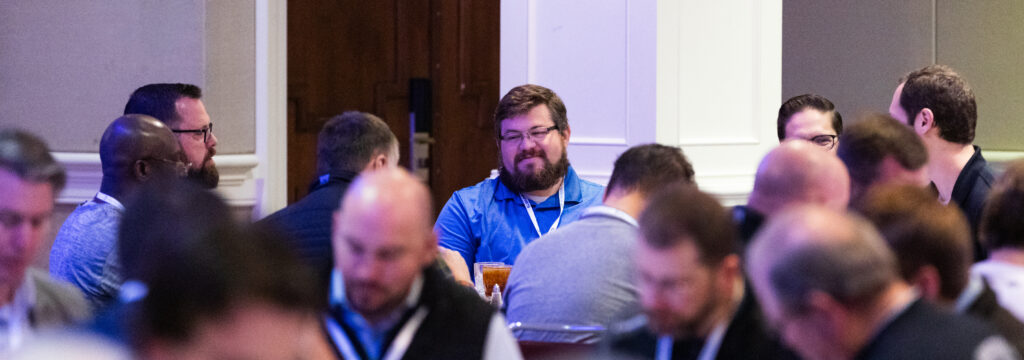
During the NC Baptist annual meeting in Greensboro on Nov. 5-7, Southeastern Seminary connected with alumni, hosted events for church and associational leaders, celebrated alumni commissioned with the International Mission Board, and delivered sermons and breakout sessions to equip pastors and attendees.
Scott Pace Celebrates God’s Favor in Seminary Report
During his seminary report on Tuesday, Scott Pace, provost of Southeastern, shared with attendees about Southeastern’s Great Commission vision for equipping local churches.
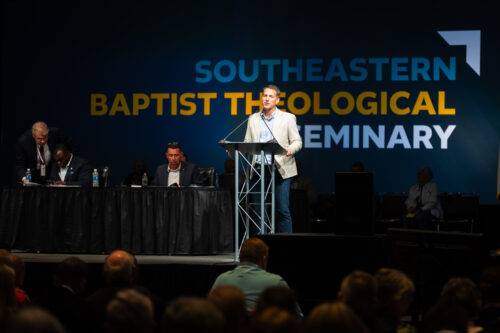 “We exist to glorify the Lord Jesus Christ by equipping students to serve the Church and fulfill the Great Commission,” noted Pace. “At Southeastern, we want to serve and resource you as local churches here in North Carolina.”
“We exist to glorify the Lord Jesus Christ by equipping students to serve the Church and fulfill the Great Commission,” noted Pace. “At Southeastern, we want to serve and resource you as local churches here in North Carolina.”
Celebrating how God has blessed Southeastern over the past year, Pace reported that Southeastern welcomed one of its largest incoming classes and closed out a record year of charitable giving, totaling more than $7 million.
Pace noted that because of this generosity, Southeastern has been able to offer full tuition scholarships for residential Master of Divinity students for three years and counting, which means there has never been a better time to pursue a Master of Divinity at Southeastern.
Pace expressed Southeastern’s desire to continue partnering with local churches and associations to equip NC Baptists to serve the Church and fulfill the Great Commission.
“Our school exists to come alongside you to serve you to reach this world for Christ,” commented Pace. “Lost people don’t just exist on the other side of the world. They exist right here around us in our communities. We are partnering to equip you to reach those people in our communities.”
Our school exists to come alongside you to serve you to reach this world for Christ.
Southeastern Professors Preach at Pastors’ Conference
On Sunday and Monday, pastors and church leaders gathered to hear expositional sermons themed around the pastoral charge in 1 Peter 5:2 to “shepherd the flock of God.” Opening the conference with a sermon from Psalm 15, Ronjour Locke, instructor of preaching and urban ministry at Southeastern, challenged attendees to return to the gospel as the foundation for the character of a biblically qualified shepherd.
Locke reminded pastors that God desires for them not only to proclaim the gospel so that others can be transformed but also to experience gospel transformation in their own lives. For Locke, too many pastors default to simply playing the part of pastor rather than trusting deeply in Christ’s power and in his finished work.
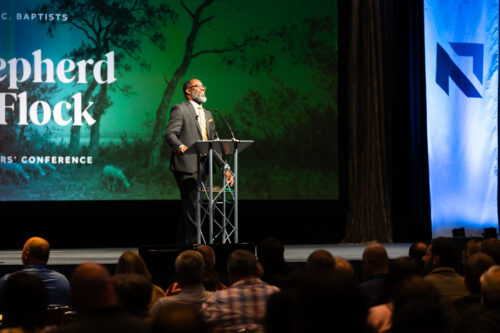
“You don’t have to keep playing the part,” Locke told pastors. “You can actually be changed and shaped by the gospel. God wants you to be shaped by the gospel and wants you to know what the gospel can do in your life.”
Locke urged pastors to remember that Christ’s righteousness is theirs and that he calls them to live out his righteousness in their ministries. For Locke, that means continuing to believe the gospel and trusting Christ to preserve and save them until he comes again.
“Pastor, do you believe the gospel?” Locke questioned. “Do you believe that if you are called to lay down your life for your church that God will raise you up. Do you believe that if you are called to make sacrifices, do you believe that God is still able to raise you up on the last day?”
Delivering Sunday’s final sermon, Jim Shaddix, senior professor of preaching and W. A. Criswell Chair of expository preaching at Southeastern, preached from Jeremiah 23:16-32, urging pastors to draw near to God and consistently seek his counsel throughout the process of sermon preparation and delivery.
“God is not just interested in the end product; he is interested in the process,” noted Shaddix. “The process is you personally and prayerfully wrestling with the text of Scripture, … crying out to the Lord for his help and the empowerment of his Holy Spirit.”
Shaddix emphasized that God expects preachers to be in his counsel, to hear from him, and to proclaim what he proclaims. If a preacher is absent from the counsel of the Lord, Shaddix observed, then that preacher will inevitably mishandle the responsibility of proclaiming God’s word, and the consequences of that failure will harm the preacher and the hearer.
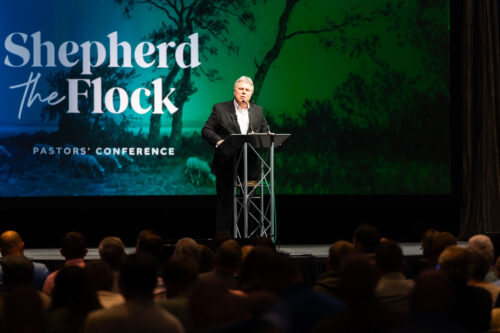
“God is serious about the care of his people, and he has entrusted us as pastors to be the primary instruments of exposing them to the only thing that can transform them into the image of the Lord Jesus Christ,” commented Shaddix.
On Monday, Danny Akin, president of Southeastern, closed the pastors’ conference with a sermon from Matthew 28:16-20, challenging attendees to prioritize the Great Commission in their preaching, in their churches, and in their everyday lives. For Akin, churches have no excuse for neglecting the mandate to make disciples because the command comes from the resurrected King Jesus who possesses all authority and is Lord over the Church.
“I don’t care how large or how small your church is, you can be on mission with our Lord, fulfilling his final marching orders,” noted Akin.
Encouraging pastors not to grow weary in well-doing, Akin urged them to continue preaching the gospel, modeling a missional lifestyle, and calling their congregations to greater faithfulness to the Great Commission.
“We have a Great Commission from a Great King,” Akin reminded attendees. “It is his divine mandate until he comes again. So, brothers and sisters, let’s pray, let’s give, let’s send, and let’s go…. He has promised to be with you every step of the way until he comes again.”
We have a Great Commission from a Great King. It is his divine mandate until he comes again.
Southeastern Honors AMS Leaders at Annual Banquet
Committed to serving local churches, Southeastern deeply values its partnership with Associational Mission Strategists (AMS) who serve on the front lines of associational life, equipping and resourcing local churches to remain faithful to God’s mission. As an annual celebration of North Carolina AMS leaders, Southeastern’s AMS banquet on Monday night offered associational leaders an opportunity to connect with one another and hear from Scott Pace.
Welcoming attendees, Todd Unzicker, executive director-treasurer of NC Baptists, and Currie Tilley, mission catalyst director at NC Baptists, thanked AMS leaders for strengthening local churches and fueling the cooperative spirit that makes North Carolina associational life a particularly vibrant place for ministry partnerships. Celebrating God’s faithfulness in their associations, attendees also recognized new and retiring AMS leaders in North Carolina.
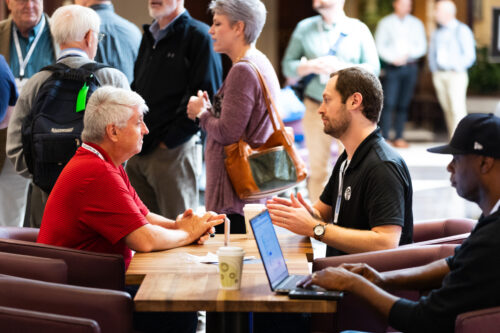
Answering the question, “How can we encourage the churches?” Pace urged AMS leaders to continue embodying the Apostle Paul’s model of encouragement found in 1 Thessalonians 1:1-10. Calling them to celebrate evidence of God’s grace in their associational pastors and churches, Pace outlined four characteristics of Paul’s encouragement: personal affection, thoughtful appreciation, mutual admiration, and spiritual affirmation.
Modeling this spirit of appreciation, Pace commended AMS leaders for their ministry, reminding them that Southeastern is committed to supporting them and championing associational partnerships.
“One of the great things about serving at Southeastern is the collaborative spirit we share, and that spirit is exactly what you embody,” Pace told attendees. “As you serve churches in your association, your goal is to help people collaborate together for the mission.”
“We are so grateful for your ministry and for the way you pour yourself out for the churches,” added Pace. “The affection you have for them, we have for you. You’re not alone in this. We are partners with you, and we want to resource you.”
Southeastern Celebrates the Mission at Alumni and Friends Luncheon
At Southeastern’s alumni and friends luncheon on Tuesday, Todd Unzicker thanked Southeastern and those in attendance for their common commitment to the Great Commission.
“I am very grateful for Southeastern Seminary,” noted Unzicker. “It is one of our closest partners with our state convention. I love the fact that Southeastern has been and continues to be a Great Commission seminary, and I love that Southeastern is training men and women to take the gospel across the street and across the world.”
I love that Southeastern is training men and women to take the gospel across the street and across the world.
During the luncheon, Southeastern faculty, Scott Pace, Steven Wade, and Steven McKinion, spoke on a panel about fostering a Great Commission culture in the local church. As pastors in the church, panelists shared best practices from their ministries and encouraged attendees to start by identifying next steps toward greater obedience to the Great Commission.
“The majority of Southern Baptists say that people ought to share the gospel with their neighbors, but they don’t necessarily know how to do that or what that means for them,” commented McKinion, professor of theology and patristic studies at Southeastern and John Leadley Dagg Chair of systematic theology. “Seeing the local church tied to the spread of the gospel through everyday believers is the starting place for us, and that will eventually lead to some of those believers answering this call to go to the nations.”
 According to Wade, professor of pastoral theology at Southeastern, developing a Great Commission culture should be a priority of pastors because disciple making is the mission of the Church. That is why pastors must understand their role in relation to the Great Commission.
According to Wade, professor of pastoral theology at Southeastern, developing a Great Commission culture should be a priority of pastors because disciple making is the mission of the Church. That is why pastors must understand their role in relation to the Great Commission.
“The shepherds of the church have a responsibility to make disciples to the nations and to the context where we are,” noted Wade. “Our task is to make disciples of our neighbors and the nations.”
The Great Commission is the call of every believer; however, fulfilling the Great Commission is not an individualistic task distinct from the function and purpose of the local church, noted Pace. The indispensable role of the local church in missions also means that the global Church is fueled and realized through the missional obedience of local churches.
“The church is the means by which the Great Commission will be accomplished,” commented Pace. “The global Church doesn’t function without the local church because the local church is the means by which the mission will be accomplished. That’s why everything we do in the local church context has to be seen within the broader mission of what God is trying to accomplish as pictured in Jesus’s last words. The gospel message is a global message.”
Ten Southeastern Alumni Commissioned During Sending Celebration
As the first state convention to host its own sending celebration with the IMB, NC Baptists commissioned around 30 missionaries to be deployed with the IMB to difficult regions and hard-to-reach places around the world.

Preaching from 2 Kings 7 during the ceremony, Paul Chitwood, president of the IMB, challenged attendees to hold the rope for those who are going to the nations and to consider whether God is calling them to likewise give their lives to international missions.
“God doesn’t expect you to do what only God can do, but once God does what only God can do, he expects you to go and tell others about it,” Chitwood reminded attendees.
Of the approximately 30 missionaries commissioned during the sending celebration, 10 of the missionaries are Southeastern alumni, who have been trained to serve the Church and fulfill the Great Commission wherever God sends them. Southeastern is proud of its alumni who are answering God’s call to the nations and is grateful to partner with local churches in equipping students to be mobilized on mission.
To learn more about how Southeastern can partner with your local church or association, visit sebts.edu/churchleaders.